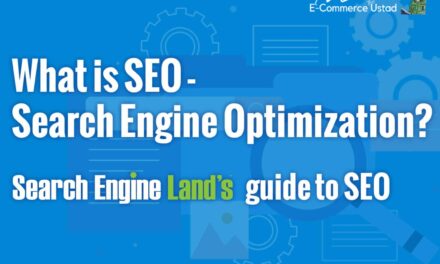
What Is SEO?

SEO Friendly interfaces enhances user experience. This includes using clear headings, logical menu structures, and easy-to-find information.
Accessibility and mobile responsiveness: Catering to all users, including those with disabilities, by ensuring website accessibility compliant with WCAG guidelines improves user experience and search engine rankings. Additionally, optimizing websites for mobile responsiveness is essential for reaching a broader audience.
Metrics and analytics: Utilizing data from tools like Google Analytics and heat maps helps identify areas of improvement in user experience. Analyzing engagement metrics, bounce rates, and conversion rates allows businesses to continuously optimize their websites for better user experience.
Tracking and Measuring SEO Success
Tracking and measuring the effectiveness of SEO campaigns is essential to understand the impact of optimization efforts. Key considerations for tracking and measuring SEO success include:
Key performance indicators (KPIs) for SEO: Determining relevant KPIs, such as organic traffic, keyword rankings, and conversion rates, enables businesses to measure the success of their SEO campaigns and make data-driven decisions.
Analyzing and interpreting SEO data: Regularly analyzing and interpreting SEO data provides insights into the effectiveness of strategies and highlights areas for improvement. Understanding trends, identifying high-performing keywords, and assessing user behavior are essential aspects of data analysis.
Tools to monitor and improve SEO campaigns: Utilizing various SEO tools like Google Search Console, Ahrefs, and Moz can help businesses monitor their search engine rankings, track backlinks, analyze website performance, and identify opportunities for optimization.
SEO Challenges and Solutions
Implementing successful SEO strategies can sometimes pose challenges. However, with the right approaches and solutions, these challenges can be overcome. Key challenges and solutions in SEO include:
Dealing with algorithm updates: Search engine algorithms are ever-evolving, and updates can significantly impact rankings. Staying ahead of the curve involves continually monitoring updates, adapting strategies, and focusing on providing high-quality, user-centric content.
Overcoming common SEO obstacles: Challenges such as duplicate content, site errors, penalties, and crawlability issues can hinder SEO efforts. By conducting regular website audits, addressing technical issues promptly, and resolving penalties, businesses can maintain optimal search engine visibility.
The Future of SEO
The future of SEO holds exciting prospects as technology continues to advance. Businesses must adapt to stay relevant. Key trends and emerging technologies in SEO include:
Voice search optimization: With the increasing popularity of voice assistants and devices, optimizing content for voice search is paramount. Understanding how users phrase voice search queries and tailoring content to match those natural language patterns will be crucial.
AI and machine learning: Advancements in AI and machine learning will shape personalized search results even further. Search engines are becoming more adept at understanding user intent, and businesses need to integrate these technologies to deliver personalized content and experiences.
Understanding Search Engines
To comprehend the role of SEO, it is necessary to grasp how search engines function. Search engines employ complex algorithms to index and rank websites based on various factors. SEO works by optimizing websites and content to align with these algorithms, improving their chances of ranking higher in search results.
The algorithmic complexities behind search rankings involve multiple factors such as keyword relevance and density, website authority, user engagement metrics, and backlink profile. By understanding these intricacies, businesses can tailor their SEO strategies to improve their visibility and ultimately attract more organic traffic.
The Pillars of SEO
On-Page SEO: Mastering the Elements Within Your Website
On-page SEO encompasses optimizing various elements within a website to make it more search engine friendly. This includes:
Meta tags and meta descriptions: These HTML tags provide brief snippets that summarize the content of a webpage, appearing in search results. Optimizing them with relevant keywords and persuasive language can improve click-through rates.
Optimized content: Crafting content that is not only informative and valuable but also optimized for target keywords can significantly impact search engine rankings. Using long-tail keywords and incorporating them naturally throughout the content helps improve relevancy.
URL structure and internal linking: Creating a concise and logical URL structure makes it easier for search engines to understand the website’s organization. Additionally, internal linking helps establish a hierarchy within the website, improving user navigation and search engine crawling.
Page loading speed: Ensuring that webpages load quickly is crucial for optimizing user experience. Search engines prioritize fast-loading websites as they provide a seamless browsing experience for users.
Off-Page SEO: Expanding Your Visibility Beyond Your Own Website
Off-page SEO involves actions taken outside of the website to improve its online visibility. Key elements of off-page SEO include:
Backlinks: Considered the backbone of off-page optimization, backlinks are links from external websites that point to a particular webpage. Building a strong and diverse backlink profile demonstrates website credibility and authority.
Social signals: Leveraging social media platforms to engage with the target audience and share valuable content can indirectly impact search rankings. Social signals, such as likes, shares, and comments, contribute to increased awareness and potential backlinks.
Guest blogging and influencer collaboration: Collaborating with industry influencers and contributing guest posts to authoritative websites can boost credibility and generate valuable backlinks, ultimately improving search engine rankings.
Keyword Research: Unveiling User Intent
Conducting effective keyword research is a crucial aspect of any SEO campaign. By understanding the intent behind users’ search queries, businesses can tailor their content to meet users’ needs. Key considerations in keyword research include:
The significance of keyword research: Keyword research provides insights into users’ search behaviors and helps businesses identify target keywords with high search volumes and low competition. This data informs content creation strategies.
Unmasking high-volume and low-competition keywords: Identifying keywords that have high search volumes, but relatively low competition, can be a game-changer. Targeting such keywords provides a higher chance of ranking well in search results and attracting valuable organic traffic.
Tools and techniques for effective keyword research: Utilizing various tools, such as Google Keyword Planner, SEMrush, and Moz, can assist businesses in identifying relevant keywords and understanding their search volume, competition, and trends.
Technical SEO: Laying the Foundation for Success
While on-page and off-page SEO focus on content and promotion, technical SEO ensures the website’s foundation is strong. Key elements of technical SEO include:
Mobile optimization: With the increasing dominance of mobile devices, optimizing websites for mobile responsiveness ensures a seamless user experience for mobile users. This optimization aspect is critical for search engine rankings, as search engines prioritize mobile-friendly websites.
Structured data and Schema markup: Implementing structured data and Schema markup helps search engines understand the context and meaning of website content. This enhanced understanding allows search engines to generate more informative and rich snippets in search results.
XML sitemaps and robots.txt: XML sitemaps help search engines crawl and index website pages effectively, while robots.txt files provide instructions to search engine crawlers on which pages to crawl or exclude. Proper utilization of both contributes to improved website indexing.
Website architecture and navigation: Designing a user-friendly website structure and navigation system improves user experience and helps search engines understand the hierarchy and relevance of webpages. Proper internal linking and logical organization are essential components of website architecture.
SEO Content Strategy: Fueling Your Rankings
Creating compelling and engaging content optimized for SEO is essential for improving search engine rankings. Key considerations in an effective SEO content strategy include:
Writing for readers and search engines: Striking a balance between creating content that is valuable and informative for readers, while also optimizing it for search engines, is crucial. Ensuring content is relevant to target keywords and satisfies user intent enhances its search engine visibility.
Long-form vs. short-form content: While both long-form and short-form content have their merits, finding the sweet spot between the two is important. Long-form content provides in-depth information and establishes authority, while short-form content caters to users seeking quick answers.
Visual content: Optimizing images and videos for search visibility can enhance overall SEO efforts. Utilizing appropriate alt tags, captions, and descriptive filenames helps search engines understand the context of visual content.
Developing an editorial calendar: Consistency and relevance are key aspects of an effective content strategy. Creating an editorial calendar ensures a steady stream of fresh and optimized content, aligning with the target keywords and overall SEO goals.
Local SEO: Targeting Your Geographical Audience
For businesses targeting specific geographical locations, local SEO plays a crucial role in attracting relevant customers. Key elements of local SEO include:
The importance of local SEO: Local SEO helps businesses appear in location-based search results, particularly in Google Maps. It is especially beneficial for brick-and-mortar establishments that primarily serve a local customer base.
Optimizing Google My Business and local directories: Claiming and optimizing business profiles on platforms like Google My Business, Bing Places, and local directories significantly improves visibility for location-based searches. It includes accurate and detailed information such as business address, phone number, and operating hours.
NAP consistency and online reputation management: Ensuring consistent and accurate Name, Address, and Phone Number (NAP) across all platforms is crucial for local SEO. Additionally, managing online reviews and ratings positively impacts a business’s reputation and search visibility.
The Role of User Experience in SEO
User experience plays
Frequently Asked Questions (FAQs)
What is the difference between organic and paid search results?
Organic search results refer to the unpaid listings that appear on search engine results pages based on their relevance to the user’s query. Paid search results, on the other hand, are the advertisements that appear at the top or bottom of the search results pages and are marked as ads.
How long does it take to see SEO results?
The time frame to see SEO results varies depending on several factors, including the competitiveness of the industry, the website’s authority, and the effectiveness of SEO strategies. Generally, it takes several months to start seeing noticeable improvements in search engine rankings, organic traffic, and conversions.
Can SEO work for small businesses?
Absolutely! SEO can yield significant results for small businesses. By implementing targeted SEO strategies and focusing on local SEO, small businesses can improve their online visibility, attract relevant traffic, and compete with larger competitors.
Is it possible to do SEO on my own without hiring an agency?
Yes, it is possible to do SEO on your own without hiring an agency. However, SEO can be a complex and time-consuming process, requiring expertise and continuous effort. Staying updated with algorithm changes, conducting effective keyword research, and implementing technical optimizations can be challenging without professional assistance.
Does social media impact SEO rankings?
While social media signals do not directly impact search engine rankings, there is a correlation between social media activity and SEO success. Engaging with the target audience on social media platforms can increase brand exposure, drive traffic to the website, and potentially lead to valuable backlinks, indirectly influencing search engine rankings.
































Recent Comments